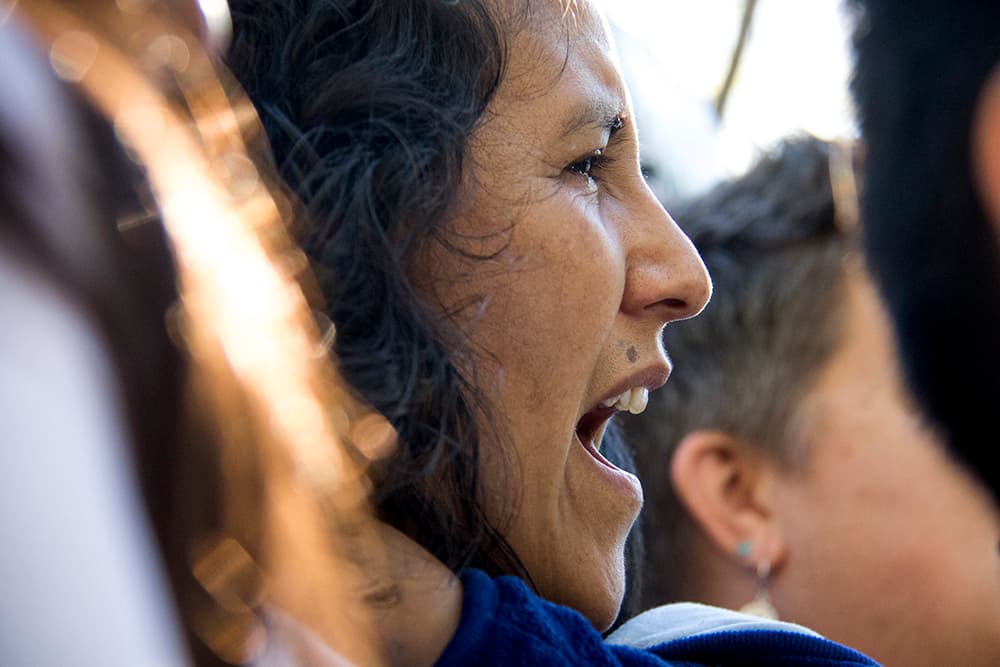
Denver has seen a 3.6 increase in crimes reported by non-Latinos but a 12 percent decrease in crimes reported by Latinos in the first three months of the year, according to an analysis by the website FiveThirtyEight.
This mirrors a drop in crime reporting that's been described in several large cities since the start of the year as immigration-related arrests have skyrocketed under President Donald Trump's administration. Immigration and Customs Enforcement released numbers this week that show more than 40,000 people have been arrested on suspected immigration violations in the first 100 days of Trump's presidency. That's a 38 percent increase over the same period last year.
“There is no category of aliens off the table,” Immigration and Customs Enforcement acting Director Thomas Homan told reporters.
A few points to be clear on: Most Latinos in the United States are not immigrants, and most immigrants are not undocumented. However, 45 percent of all immigrants and a majority of undocumented immigrants nationwide are Latino. Many extended families include members who are citizens, legal immigrants and unauthorized immigrants. So if immigrants are more afraid to report crimes, it's likely to show up as a drop in reporting among Latinos.
FiveThirtyEight asked a dozen cities with large populations of undocumented immigrants for data on crime reporting. Houston and Los Angeles, where police chiefs commented publicly on a supposed drop in crime reporting, did not provide data, and some cities didn't have crime reporting data broken out by race and ethnicity. Two cities provided relevant data, Denver and Philadelphia, and FiveThirtyEight was able to obtain data from Dallas via an open portal. Philadelphia also reported a decrease in crime reporting by Latinos compared to non-Latinos, but the discrepancy was smaller than in Denver.
Dallas didn't see a drop in reporting among Latinos, but crime reports from heavily immigrant zip codes were down. And author Rob Arthur notes that the data excluded sexual offenses and domestic violence, crimes where the perpetrator and the victim often know each other and have a pre-existing relationship.
Domestic violence victims might not be afraid only for themselves, but they might not want their partner to face a deportation risk if they depend on him financially. Police chiefs in Houston and Los Angeles specifically said they'd seen a decline in reporting of those crimes.
Denver police spokesman Doug Schepman said the department isn't entirely sure what's driving the decrease in reporting, and analysts are doing a more comprehensive study of the numbers to date to understand them better. FiveThirtyEight looked at nine classes of crime, and the department is looking at all categories of crime.
Reports of domestic violence-related aggravated assault -- assault with more serious injuries where reporting may be more difficult to avoid -- are actually up among both Latino and non-Latino residents, but reports of other assaults, as well as harassment, violation of a court order, violation of a restraining order and threats to injure, are all down among Latinos. With the exception of harassment and simple assault, crime reports have increased among non-Latino residents of the city.
"The Denver Police Department doesn't want to see a drop in crime reporting from any part of our community, and we will continue doing community outreach to help ensure people feel comfortable reporting crimes and requesting police services when they need us," Schepman said in an email.
In February, immigration authorities arrested a domestic violence victim in El Paso, Texas, when she went to court to get a restraining order. ICE agents have been seen inside and immediately outside Denver courthouses waiting to arrest people, though in those cases the person arrested on immigration charges was a defendant, not a victim or witness. City officials have asked ICE to stay away from courthouses, but the agency says they aren't covered by its "sensitive locations" policies and sometimes are the best place to find people wanted for deportation.
FiveThirtyEight took this question to ICE.
U.S. Immigration and Customs Enforcement spokeswoman Dani Bennett said in a written statement that ICE “take[s] into consideration if an individual is the immediate victim or witness to a crime in determining whether to take enforcement action.” She pointed to a special immigrant status called a U-visa, which allows non-citizens — including those in the country illegally — to report crimes without fear of deportation, although law enforcement agencies can award such visas inconsistently. ICE declined to comment further.
City officials report that a number of domestic violence victims have stopped cooperating with prosecutors because they fear deportation. Jeanette Vizguerra, one of Colorado's most well-known undocumented immigrants, is eligible for a U-Visa, but that didn't stop ICE from issuing a deportation order for Vizguerra earlier this year. She entered sanctuary in a Denver church and received a two-year reprieve last week.
This story has been updated with comments from the Denver Police Department and more details about which crimes have seen reports go up or down.












